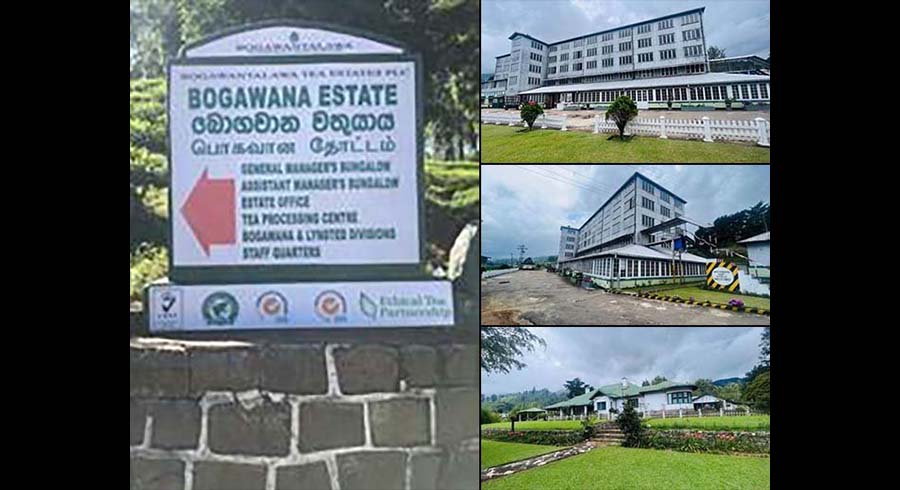Its story begins in the late 19th century, when the island’s coffee plantations collapsed under the weight of a devastating fungal disease.
Amid this uncertainty, Scottish planters turned to tea, guided by the cool climate, rich soil and misty slopes of the valley.
Bogawana emerged during this period of transformation, when new estates just being established across the valley.
This was no easy feat given the dense forest cover that had to be cleared, roads and factories constructed and housing provided for workers.
Over the years, consistent dedication and careful cultivation earned Bogawana a reputation for its high-grown teas, prized for their bright colour and brisk taste.
By the early 20th century, it had risen to prominence as one of Sri Lanka’s most esteemed tea estates.
The unique climate of the Golden Valley plays a central role in shaping the character of Bogawana teas.
Misty, cool mornings, balanced sunlight and mineral-rich soils combine to create the conditions that make its teas distinct.
The slow growth of leaves at higher altitudes allows for the development of complex flavor, earning Bogawana recognition at both local and international tea auctions.
Heritage and Progress Hand in Hand
Bogawana’s legacy has always been tied to its people. Generations of estate families have lived and worked there and their livelihoods and traditions are interwoven with the land.
Hand-plucking remains central to operations, with skilled workers selecting the finest two leaves and a bud from each shoot, a craft passed down over generations.
While maintaining these traditions, the estate has steadily adapted to modern demands.
Factories have introduced energy-efficient dryers and digital weighing systems to ensure quality and reduce waste.
Soil health is monitored through precision agriculture, while renewable energy and reforestation projects form part of the daily operations.
The management of Bogawantalawa Tea Estates PLC, which manages Bogawana, has placed equal focus on community well-being.
Every family on the estate is provided with housing and access to clean water, electricity and healthcare.
A water purification project valued at Rs. 22 million provides safe drinking water to the estate community, a local school and a child development center.
Estate clinics, nutrition programs and maternal care services continue to strengthen community health.
With support from Fairtrade funds, the estate provides school supplies and scholarships to children each year.
Recently, the Bogawana Tamil School received a smart board worth Rs. 1.8 million, donated in collaboration with the Ceylon Tea Traders’ Association.
These initiatives ensure that children from the estate have access to modern learning tools and equal educational opportunities.
Women’s participation has also expanded beyond traditional roles. Today, many women take on supervisory and administrative responsibilities.
Skills training and welfare committee involvement have helped build confidence and independence, helping create a more connected and empowered community.
Climate-Positive Teas and A Sustainable Path Forward
Bogawantalawa Tea Estates PLC is the world’s first producer of climate-positive tea.
This achievement is the result of a long-term journey that began in 2009, when the company started measuring its carbon footprint.
By 2016, it had achieved carbon-neutral certification, and in 2019, Bogawana became part of the first group of estates globally to produce climate-positive teas.
Hydropower plants and solar panels now generate a significant portion of the estate’s electricity needs.
Organic fertilizers and composting programs supplements the chemical input, improving soil health and biodiversity.
Reforestation projects across ridges and streams have created habitats for birds and other wildlife, while reducing erosion and strengthening the local ecosystem.
This integrated approach ensures that Bogawana removes more carbon from the atmosphere than it emits.
In line with its 2025 target, the estate aims to achieve a net removal of 0.40 kilograms of CO₂ equivalent per kilogram of tea produced.
This transition is guided by international standards such as ISO 14064 and verified annually by independent bodies.
The estate’s efforts have earned it global recognition through certifications from Rainforest Alliance, Fairtrade, ISO, Ethical Tea Partnership and UTZ.
These certifications represent transparency and accountability in both production and labor practices.
As Chief Executive Officer of Bogawantalawa Tea Estates PLC, Feroze Majeed remarked,
“Bogawana holds a special place in our story.
Its fields and factories reflect the balance between tradition and innovation that defines the Golden Valley.
The dedication of its people and the commitment to sustainability continue to inspire the direction of our company.”
Today, Bogawana’s teas are exported to over 30 countries, from Europe to Japan and the Middle East.
Their consistency and ethical production have earned the trust of international buyers and consumers.
Bogawana’s journey is a reminder that shows how an estate rooted in heritage can lead the way in responsible agriculture where quality, care and sustainability are not separate ideals, but parts of one lasting tradition.






















